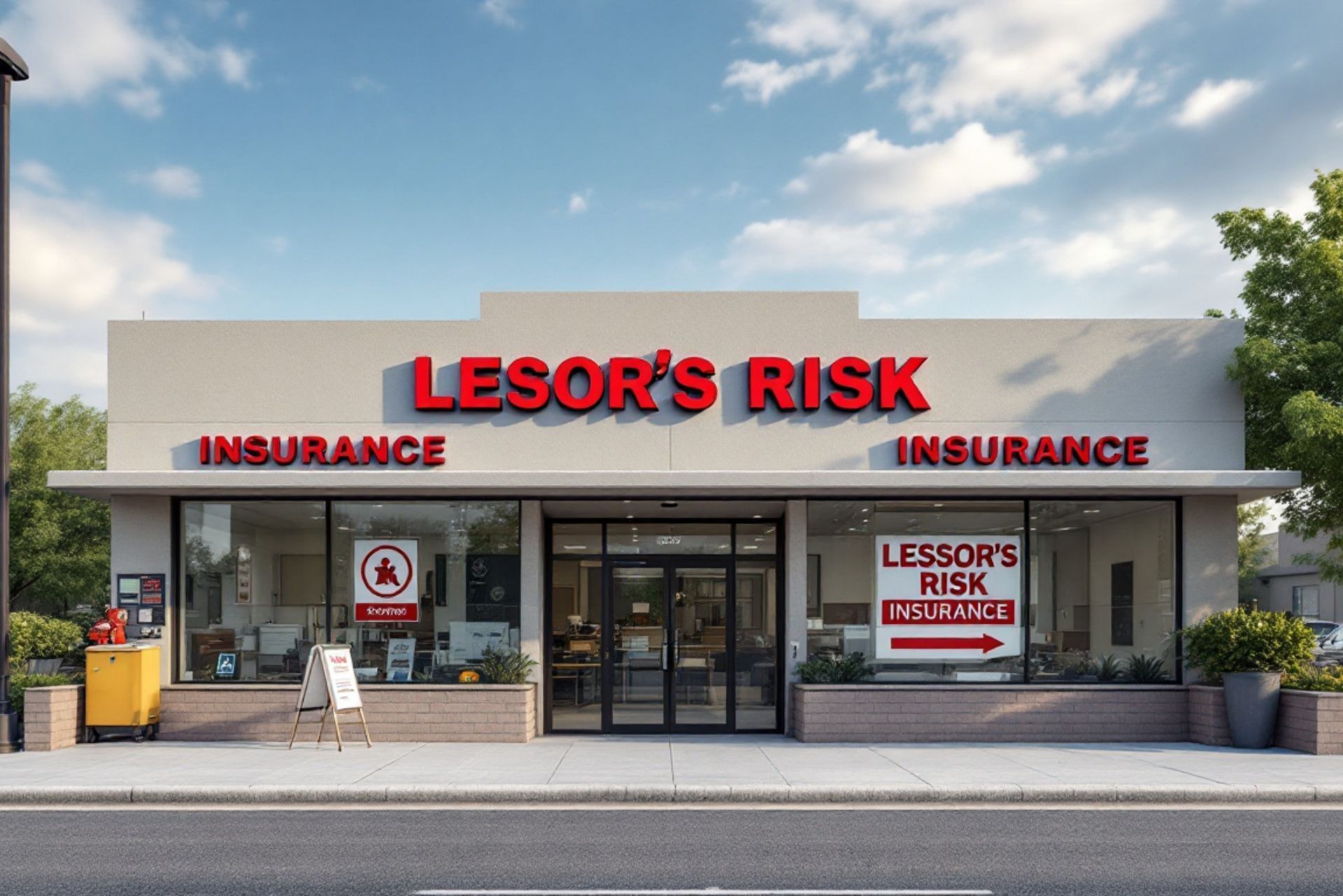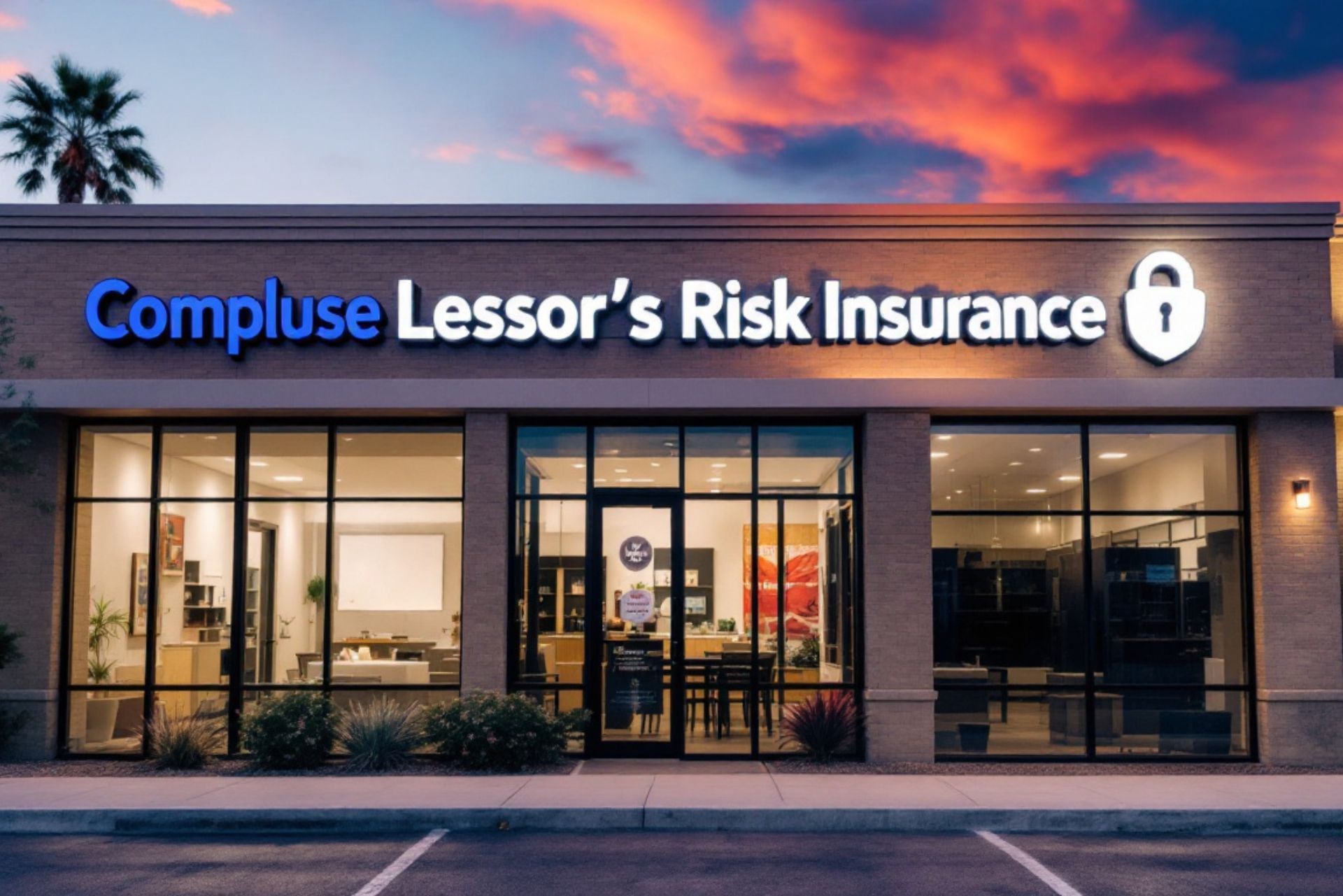
Most Common Business Policies
Index
Contact Us
Lessor's risk insurance is a critical component for property owners and landlords in Arizona who lease their properties to tenants. This specialized insurance provides coverage for potential liabilities that may arise from the leasing of commercial or residential properties. Understanding the intricacies of lessor's risk insurance is essential for anyone involved in property leasing, whether you are a seasoned landlord or a new property owner.
What is Lessor's Risk Insurance?
Lessor's risk insurance is designed to protect landlords from liabilities associated with the rental of their properties. This type of insurance covers various risks, including bodily injury, property damage, and legal fees that may arise from tenant activities. It is particularly important for landlords who do not occupy the property themselves, as they may be held responsible for incidents that occur on their premises. In addition to safeguarding the financial interests of landlords, this insurance also provides peace of mind, allowing them to focus on managing their properties without the constant worry of potential lawsuits or claims arising from tenant-related incidents.
Key Features of Lessor's Risk Insurance
This insurance typically includes coverage for several key areas, ensuring that property owners are adequately protected. Some of the main features include:
- Bodily Injury Liability: This covers medical expenses and legal costs if a tenant or visitor is injured on the property.
- Property Damage Liability: This protects against damages to the property caused by tenants or their guests.
- Legal Defense Costs: If a lawsuit is filed against the property owner, this coverage helps pay for legal fees and court costs.
Moreover, lessor's risk insurance can also include additional endorsements that provide coverage for specific situations, such as damage caused by natural disasters or vandalism. This flexibility allows landlords to tailor their policies to meet their unique needs, ensuring comprehensive protection against a wide range of potential liabilities. Understanding these features is crucial for landlords to make informed decisions regarding their insurance needs and to ensure they are adequately covered in the event of unforeseen incidents.
Who Needs Lessor's Risk Insurance?
Any landlord or property owner who leases out their property should consider obtaining lessor's risk insurance. This is especially true for those who rent commercial spaces, as the risks associated with businesses operating on the premises can be significant. Residential landlords can also benefit from this coverage, particularly if they have multiple rental units or properties. Additionally, property owners who engage in short-term rentals, such as vacation homes listed on platforms like Airbnb, should also consider this type of insurance, as the frequency of tenant turnover can increase the likelihood of incidents occurring.
Furthermore, landlords may find that some leasing agreements require proof of lessor's risk insurance before tenants can occupy the property. This requirement not only protects the landlord but also reassures tenants that they are entering into a safe and secure rental environment. By investing in lessor's risk insurance, landlords can enhance their reputation and attract quality tenants, knowing they have a solid safety net in place should any issues arise during the rental period.

The Importance of Lessor's Risk Insurance in Arizona
Arizona's unique climate and demographic factors contribute to specific risks that landlords must consider. The state experiences extreme weather conditions, including intense heat and occasional flooding, which can impact properties and increase liability risks. Additionally, the rapid population growth in urban areas like Phoenix and Tucson has led to a diverse mix of tenants, each with their own set of expectations and behaviors that can further complicate a landlord's responsibilities.
Understanding Arizona's Rental Market
The rental market in Arizona has been growing steadily, with a surge in demand for both residential and commercial properties. This growth means more landlords are entering the market, and with that comes an increased need for protection against potential liabilities. Understanding the local rental market dynamics can help landlords make informed decisions about their insurance needs. For instance, the rise of short-term rentals, particularly in tourist-heavy areas, has introduced new challenges and considerations for landlords, including the need for specialized coverage that addresses the unique risks associated with transient tenants.
Common Risks Faced by Landlords in Arizona
Landlords in Arizona face various risks that can lead to liability claims. Some of these include:
- Slip and Fall Accidents: With many properties featuring pools or outdoor areas, slip and fall incidents can be common. Ensuring proper maintenance and safety measures can help mitigate these risks, but landlords must also be aware of the legal implications if an accident occurs.
- Property Damage from Natural Disasters: Arizona is prone to dust storms and monsoons, which can cause significant damage to properties. Landlords should consider additional coverage options that specifically address these weather-related risks, as standard policies may not fully protect against such events.
- Tenant Activities: Activities such as parties or gatherings can lead to property damage or injuries, increasing liability exposure. Landlords may want to implement clear guidelines and lease agreements that outline tenant responsibilities, helping to reduce the likelihood of disputes and claims.
Moreover, the increasing trend of remote work has led to a shift in tenant demographics, with more families and professionals seeking rental properties that accommodate home offices and outdoor spaces. This shift not only influences property features but also raises new considerations for landlords regarding tenant satisfaction and retention. As the landscape of rental properties evolves, so too must the strategies landlords employ to protect their investments and ensure compliance with local regulations.
How to Obtain Lessor's Risk Insurance in Arizona
Acquiring lessor's risk insurance in Arizona involves several steps. Property owners should approach the process with careful consideration to ensure they receive adequate coverage for their specific needs.
Assessing Your Coverage Needs
The first step in obtaining lessor's risk insurance is to assess your coverage needs. This involves evaluating the type of property you own, the number of tenants, and the potential risks associated with your property. Consider factors such as:
- The location of your property and its susceptibility to natural disasters.
- The type of tenants you have and their activities.
- The overall condition of the property and any potential hazards.
Additionally, it is wise to consider the history of claims in your area. For instance, if your property is located in a region prone to wildfires or flooding, understanding the frequency and severity of such events can help you gauge the level of coverage you may need. Furthermore, if your tenants include businesses that may have specific insurance requirements, such as restaurants or gyms, this can also influence your decision on the type and amount of coverage necessary to protect against unique liabilities.
Shopping for Insurance Providers
Once you have assessed your needs, the next step is to shop around for insurance providers. It is advisable to compare quotes from multiple insurers to find the best coverage at a competitive price. Look for providers that specialize in lessor's risk insurance, as they will have a better understanding of the specific needs and risks associated with property leasing.
When evaluating potential insurers, consider their reputation and customer service track record. Reading online reviews and seeking recommendations from other property owners can provide valuable insights into how responsive and helpful an insurance company is when claims arise. Additionally, inquire about any discounts or bundled services they may offer, such as combining lessor's risk insurance with other types of property insurance, which could lead to cost savings.
Understanding Policy Terms and Conditions
Before finalizing your insurance policy, it is crucial to thoroughly understand the terms and conditions. Pay attention to the following:
- Coverage Limits: Ensure that the policy limits are sufficient to cover potential liabilities.
- Exclusions: Be aware of what is not covered by the policy, as this can significantly impact your protection.
- Deductibles: Understand the deductibles associated with the policy, as this will affect your out-of-pocket expenses in the event of a claim.
Moreover, it is essential to clarify how claims are handled and the process you will need to follow should an incident occur. Some policies may have specific requirements for reporting claims or timelines that must be adhered to, which can affect the outcome of your claim. Additionally, consider discussing with your insurer the possibility of adding endorsements or riders to your policy that can enhance your coverage, such as protection against tenant default or vandalism, which can be particularly relevant in high-traffic rental areas.
Cost Factors for Lessor's Risk Insurance
The cost of lessor's risk insurance can vary significantly based on several factors. Understanding these factors can help landlords budget appropriately for their insurance needs.
Property Location
The location of the property plays a significant role in determining insurance costs. Properties in high-risk areas, such as those prone to flooding or crime, may incur higher premiums. Conversely, properties in safer neighborhoods may benefit from lower rates. Additionally, urban properties might face different challenges compared to rural ones, including higher population density and potential for greater liability claims. Landlords should also consider local regulations and building codes, as these can influence insurance requirements and costs.
Type of Property
The type of property being leased also affects insurance costs. Commercial properties often have higher premiums due to the increased risk associated with business activities. Residential properties may have lower rates, but factors such as the number of units and amenities can influence pricing. For instance, a multi-family dwelling with shared facilities might require more comprehensive coverage compared to a single-family rental. Furthermore, specialized properties, such as those with unique features or high-value contents, may necessitate additional endorsements or riders, further impacting the overall insurance cost.
Claims History
A landlord's claims history can impact insurance premiums. If a property owner has a history of frequent claims, insurers may view them as a higher risk and charge higher premiums. Maintaining a good claims history can help keep costs down. It's also beneficial for landlords to implement preventive measures, such as regular property maintenance and safety inspections, which can reduce the likelihood of claims. Insurers often reward proactive risk management with lower premiums, making it essential for landlords to be vigilant in protecting their properties and tenants.

Benefits of Lessor's Risk Insurance
Investing in lessor's risk insurance provides numerous benefits for property owners. These advantages can significantly outweigh the costs associated with obtaining coverage.
Financial Protection
The primary benefit of lessor's risk insurance is financial protection. In the event of a liability claim, the insurance can cover legal fees, medical expenses, and damages, preventing significant financial loss for the property owner. This type of insurance is particularly critical in today's litigious society, where even minor incidents can lead to costly lawsuits. By having this coverage, property owners can safeguard their investments and ensure that they are not left vulnerable to unexpected financial burdens that could arise from tenant-related incidents.
Peace of Mind
Knowing that you have insurance coverage in place can provide peace of mind for landlords. This assurance allows property owners to focus on managing their properties and tenants without constantly worrying about potential liabilities. Moreover, this peace of mind extends beyond just the landlord; it can also create a more positive environment for tenants, who feel secure knowing that their landlord is prepared for unforeseen circumstances. This can lead to better tenant retention and satisfaction, as renters appreciate the stability and professionalism that comes with a well-insured property owner.
Attracting Tenants
Having lessor's risk insurance can also be a selling point when attracting tenants. Many potential renters prefer properties owned by landlords who are insured, as it indicates a level of professionalism and responsibility. Furthermore, in competitive rental markets, showcasing insurance coverage can set a property apart from others that may lack such protections. This not only enhances the property’s appeal but can also justify higher rental rates, as tenants may be willing to pay a premium for the added assurance that comes with a well-insured landlord. Additionally, landlords can leverage their insurance coverage in marketing materials, emphasizing their commitment to maintaining a safe and secure living environment for all residents.
Compliance with Lease Agreements
In many cases, lessor's risk insurance is a requirement outlined in lease agreements with tenants. This compliance ensures that both parties are protected and that the landlord meets their legal obligations. By having this insurance in place, landlords can avoid potential disputes with tenants regarding liability issues, fostering a smoother landlord-tenant relationship. Moreover, being compliant with insurance requirements can enhance a landlord's reputation in the community, making it easier to build trust with current and prospective tenants alike.
Common Misconceptions About Lessor's Risk Insurance
Despite its importance, there are several misconceptions surrounding lessor's risk insurance that can lead to confusion among property owners.
It’s Only for Commercial Properties
One common misconception is that lessor's risk insurance is only necessary for commercial properties. While it is particularly crucial for commercial landlords, residential property owners can also face significant liabilities that necessitate this type of coverage. For instance, if a tenant or visitor is injured on the property, residential landlords can be held liable for medical expenses and other damages. This exposure to risk underscores the need for all property owners, regardless of the type of property, to consider lessor's risk insurance as a vital part of their risk management strategy.
It Covers All Types of Liability
Another misconception is that lessor's risk insurance covers all types of liability. While it provides broad coverage, there are specific exclusions that landlords should be aware of. For example, damages resulting from intentional acts or certain types of environmental hazards may not be covered under a standard policy. Understanding these limitations is essential for effective risk management, as it allows landlords to identify potential gaps in their coverage and seek additional policies or endorsements to fill those gaps. This proactive approach not only protects their financial interests but also ensures that they are prepared for unexpected incidents that could arise.
It’s Too Expensive
Many landlords believe that lessor's risk insurance is prohibitively expensive. However, by shopping around and comparing quotes, property owners can often find affordable options that provide adequate coverage. Additionally, factors such as location, property type, and the landlord's claims history can significantly influence premium rates. Engaging with an insurance broker who specializes in landlord insurance can also yield insights into discounts and tailored policies that fit specific needs. By taking the time to explore different options and understand the nuances of their coverage, landlords can secure the necessary protection without breaking the bank.
Conclusion
In summary, lessor's risk insurance is a vital component for property owners in Arizona. It offers essential protection against potential liabilities that can arise from leasing properties. By understanding the nature of this insurance, assessing individual needs, and shopping for the right coverage, landlords can safeguard their investments and ensure peace of mind.
As the rental market continues to grow in Arizona, the importance of lessor's risk insurance will only increase. Property owners should prioritize obtaining this coverage to protect themselves and their assets in an ever-evolving landscape.
Ultimately, being informed about lessor's risk insurance empowers landlords to make educated decisions, ensuring that they are well-prepared for any challenges that may arise in the course of their property leasing endeavors.
